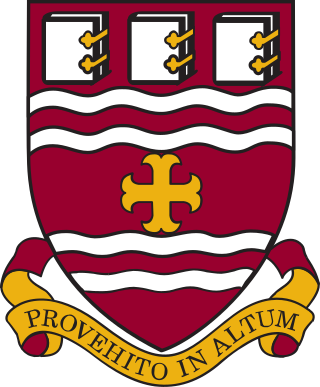
Memorial University of Newfoundland, also known as Memorial University or MUN, is a public research university in the province of Newfoundland and Labrador, based in St. John's, with satellite campuses in Corner Brook, elsewhere in Newfoundland and in Labrador, Saint Pierre, and Harlow, England. Memorial University offers certificate, diploma, undergraduate, graduate, and post-graduate programs, as well as online courses and degrees.
The Liberal Party of Newfoundland and Labrador is a political party in the province of Newfoundland and Labrador, Canada. The party is the provincial branch, and affiliate of the federal Liberal Party of Canada. It has served as the Government of Newfoundland and Labrador since December 14, 2015. The NL Liberals were re-elected to a majority government in the 2021 provincial election.

The Progressive Conservative Party of Newfoundland and Labrador is a provincial political party in Newfoundland and Labrador, Canada. The party was founded in 1949 and most recently formed the Government of Newfoundland and Labrador from the 2003 general election until the 2015 general election. The party has served as the official opposition to the government of Newfoundland and Labrador since 14 December 2015. On October 14, 2023, MHA Tony Wakeham was elected leader.

The Trans-Labrador Highway (TLH) is the primary public road in Labrador, the mainland portion of the province of Newfoundland and Labrador, Canada. The highway's total length is 1,149 km (714 mi). The paving of the entire highway was completed in July 2022.

A paramedic is a healthcare professional, providing pre-hospital assessment and medical care to people with acute illnesses or injuries. In Canada, the title paramedic generally refers to those who work on land ambulances or air ambulances providing paramedic services. Paramedics are increasingly being utilized in hospitals, emergency rooms, clinics and community health care services by providing care in collaboration with registered nurses, registered/licensed practical nurses and registered respiratory therapists.
The Canadian Federation of Nurses Unions is a trade union centre in Canada. The CFNU is a federation of provincial unions representing nurses, nurse practitioners, student nurses, and various allied health care workers. It advocates on a national level for issues related to nurses, patient care, the health care system, and working conditions. As of 2023, the CNFU represents nearly 250,000 nurses and student nurses across Canada, who are members of the nine provincial nurses unions and Canadian Nursing Students’ Association.

Law enforcement in Canada is the responsibility of police services, special constabularies, and civil law enforcement agencies, which are operated by every level of government, some private and Crown corporations, and First Nations. In contrast to the United States or Mexico, and with the exception of the Unité permanente anticorruption in Quebec and the Organized Crime Agency of British Columbia, there are no organizations dedicated exclusively to the investigation of criminal activity in Canada. Criminal investigations are instead conducted by police services, which maintain specialized criminal investigation units in addition to their mandate for emergency response and general community safety.
Health regions, also called health authorities, are a governance model used by Canada's provincial and territorial governments to administer and deliver public health care to all Canadian residents.
Central Health was the governing body for healthcare regulation in an area of the Canadian province of Newfoundland and Labrador. The area region included the communities of:
Western Health was the governing body for healthcare regulation in an area of the Canadian province of Newfoundland and Labrador. The area region included the communities of:

Kathleen Mary Margaret "Kathy" Dunderdale is a politician and former MHA who served as the tenth premier of Newfoundland and Labrador from December 3, 2010, to January 24, 2014. Dunderdale was born and raised in Burin; before entering politics she worked in the fields of community development, communications, fisheries and social work. Her first foray into politics was as a member of the Burin town council, where she served as deputy mayor. She was also a Progressive Conservative Party (PC) candidate in the 1993 general election and served as President of the PC Party.
The Capital District Health Authority was the largest of the nine health authorities in the Canadian province of Nova Scotia. In 2015 it was merged into the new, province-wide Nova Scotia Health Authority.

Newfoundland and Labrador has had the same growing pains as other provinces in developing its own form of education and now boasts a very strong, although relatively small, system. The direction of Newfoundland and Labrador's policy has evolved rapidly since the late 1990s, with increased funding, participation rates, accessibility and transferability. Many of the directives the government has been acting upon in the past 10 years have been a result of recommendations that stemmed from a 2005 white paper: Foundation for Success: White Paper on Public Post-Secondary Education. It set the course for furthering the strategic directives of the provincial post-secondary education sector. Some of its recommendations aimed to:

Resettlement in Newfoundland and Labrador terms refers to an organized approach to centralize the population into growth areas. It is used in the current context when referring to a voluntary relocation initiated from isolated communities themselves.
John Alastair Haggie is a Canadian politician, who was elected to the Newfoundland and Labrador House of Assembly in the 2015 provincial election. He represents the electoral district of Gander as a member of the Liberal Party.
The COVID-19 pandemic in Newfoundland and Labrador is an ongoing viral pandemic of coronavirus disease 2019 (COVID-19), a novel infectious disease caused by severe acute respiratory syndrome coronavirus 2 (SARS-CoV-2). As of April 12, 2023, there have been 55,091 cases and 339 deaths confirmed in Newfoundland and Labrador. As of April 13, 2023, 745,617 tests have been completed.

Andrew John Furey is a Canadian politician and surgeon who has served as the 14th premier of Newfoundland and Labrador since August 19, 2020. A member of the Newfoundland and Labrador Liberal Party, Furey represents Humber-Gros Morne in the House of Assembly. As of 2023, he is the only premier of a province whose government is controlled by the Liberal Party.
Labrador-Grenfell Health was the governing body for healthcare regulation in an area of the Canadian province of Newfoundland and Labrador. The area included the region of Labrador and the northern and eastern part of the Great Northern Peninsula.
Janice Fitzgerald ONL is a Canadian family physician. Since September 2019, she currently serves as Newfoundland and Labrador's Chief Medical Officer of Health, and has provided public health guidance to lead the province during the COVID-19 pandemic in Newfoundland and Labrador.
Newfoundland and Labrador Health Services is the integrated health authority of Newfoundland and Labrador, tasked with the administration and delivery of health care services across the province.









